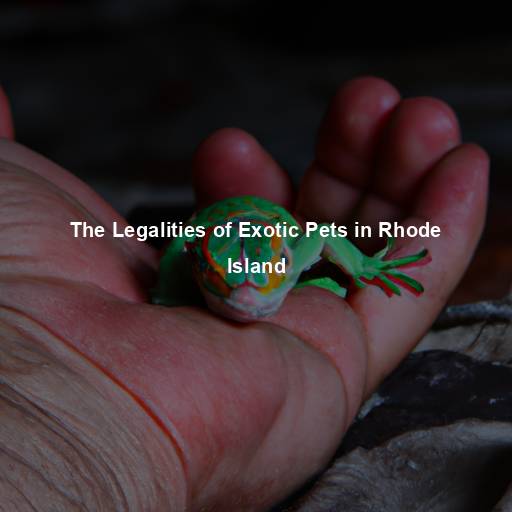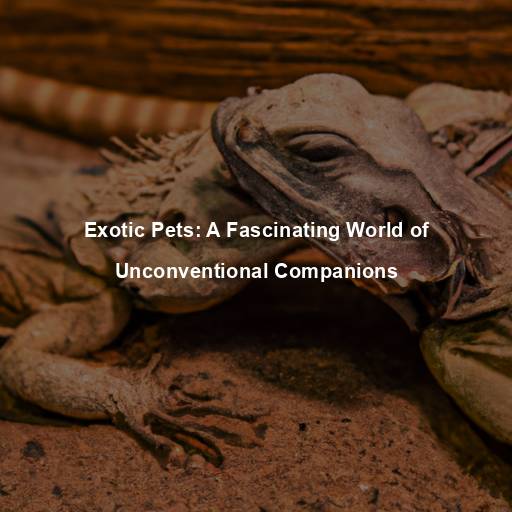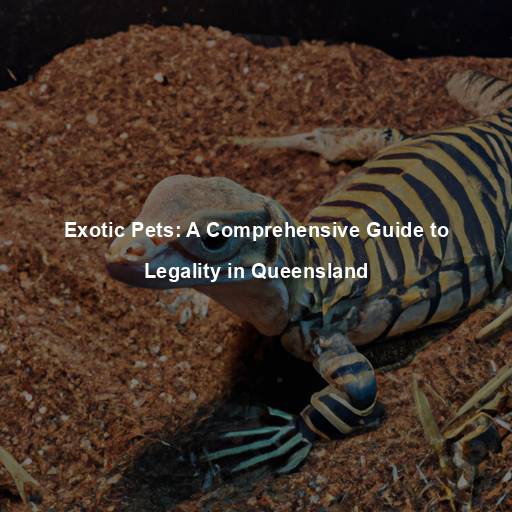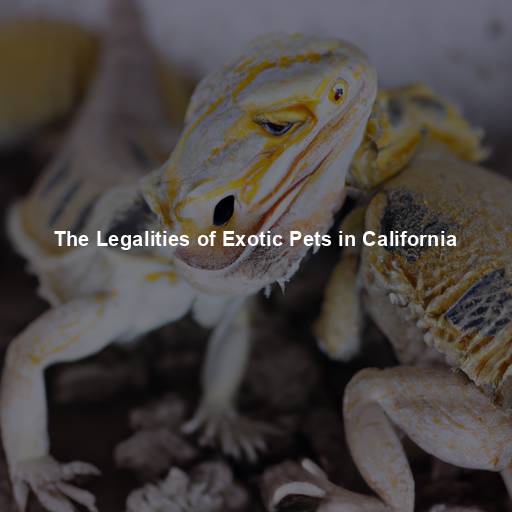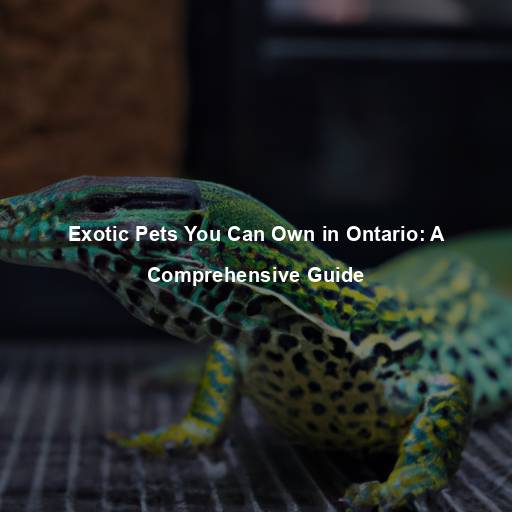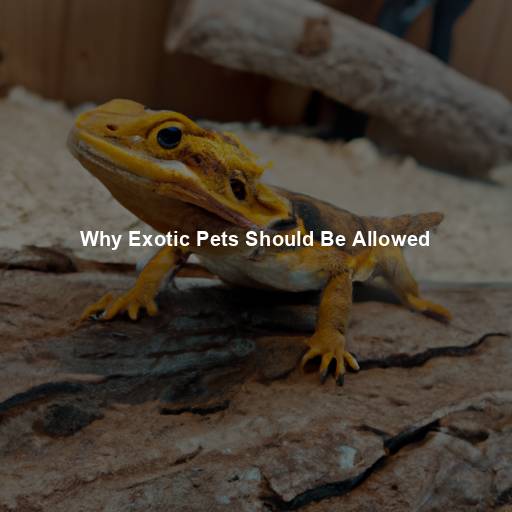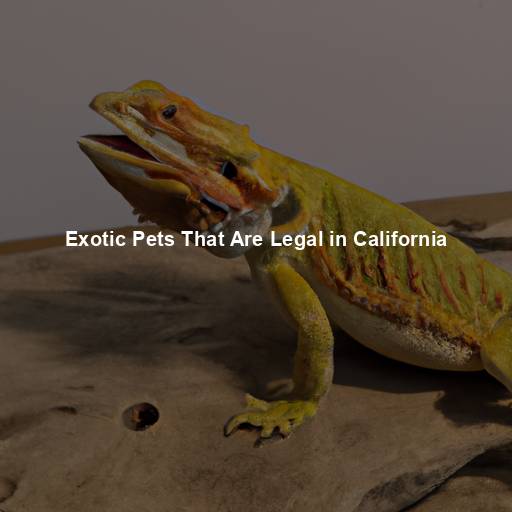The Legalities of Exotic Pets in Rhode Island
Last Updated on July 14, 2023 by Evan
Contents [hide]
- 1
- 2 Understanding Exotic Pets
- 3 Legal Considerations for Exotic Pet Ownership in Rhode Island
- 4 Responsible Exotic Pet Ownership
- 5 Responsible Exotic Pet Ownership (Continued)
- 6 FAQs: What Exotic Pets are Legal in Rhode Island?
- 6.1 What exotic pets can I legally own in Rhode Island?
- 6.2 Do I need a permit or license to own an exotic pet in Rhode Island?
- 6.3 Can I own a pet monkey in Rhode Island?
- 6.4 Are there any restrictions on owning reptiles in Rhode Island?
- 6.5 Can I keep a pet bird or parrot in Rhode Island?
- 6.6 What types of fish can I legally keep as pets in Rhode Island?
- 6.7 Are there any other regulations I should be aware of when owning an exotic pet in Rhode Island?
Rhode Island, with its rich natural beauty and diverse wildlife, has always been an intriguing place for animal enthusiasts. Many people have a fascination with exotic pets, those unique and captivating creatures that add a touch of the extraordinary to our lives. However, owning an exotic pet comes with its own set of challenges, particularly when it comes to legalities. In this article, we will explore the regulations and restrictions surrounding exotic pets in Rhode Island, providing you with a comprehensive guide to understanding what is permissible and what is not in this charming state.
Understanding Exotic Pets
What Defines an Exotic Pet?
As we embark on the journey to understand the legal complexities surrounding exotic pets, it is paramount to establish a clear definition of what these enchanting creatures truly are. While our furry companions, like dogs and cats, have long been intertwined with domesticity, exotic pets are a different breed altogether. Unfamiliar and uncommon, they hail from distant lands, spanning from reptiles and amphibians to avian wonders, diminutive mammals, and yes, even the mysterious world of insects. However, their allure comes with a price – their well-being relies on specialized care and bespoke habitats, making them simultaneously captivating and perplexing choices for those brave souls who choose to take on the challenge of owning one.
The Appeal of Exotic Pets
Many individuals are drawn to the allure of exotic pets for various reasons. Some may find the exotic appearance or behaviors of these creatures captivating, while others appreciate the opportunity to care for a species that is not commonly found in their region. Exotic pets can offer a sense of novelty and intrigue, fostering a deeper understanding and appreciation for the natural world.
Legal Considerations for Exotic Pet Ownership in Rhode Island
The Rhode Island Exotic Animal Regulations Act
In Rhode Island, the ownership of exotic pets is regulated by the Exotic Animal Regulations Act. This legislation sets forth guidelines and restrictions to ensure the safety of both the animals and the community. It is essential for prospective exotic pet owners to familiarize themselves with these regulations to avoid any legal complications.
Prohibited Exotic Pets
Rhode Island, known for its vibrant blend of wildlife and human presence, holds both the allure and caution in its stance on exotic pet ownership. The grand tapestry of this state’s legislation weaves a backdrop of paradox, striking a delicate balance between allowing some species to be cherished within the confines of homes, while reserving stern restrictions to safeguard the sanctity of both animal welfare and public safety. Within this intricate dance, the curtain firmly falls on the following species, deemed too untamed for domesticity, leaving us to ponder the enigmatic beauty they possess, only to be admired from afar. Threatened with perplexity and curiosity, these forbidden creatures enlighten our desire for the unconventional, yet remain forever veiled behind the enigma of prohibition.
At our esteemed magazine, we deeply value the safety and welfare of our readers, and as such, we must respectfully inform you that the presence of formidable creatures like lions, tigers, bears, and wolves is not permissible within our pages. These magnificent animals, while awe-inspiring, demand intricate care and possess an inherent capacity for danger, making their inclusion an imprudent choice.
– Primates: Primates, including monkeys and apes, are not permitted as pets due to their complex social needs and potential health risks.
– Venomous Reptiles: Species of venomous reptiles, such as venomous snakes, are prohibited due to the potential danger they pose.
Permissible Exotic Pets
Rhode Island, a land of enigmatic allure, holds within its borders a mysterious world of legally permissible exotic pets. However, traversing this perilous realm is not for the faint-hearted. As the curious adventurer, one must be prepared to navigate through a labyrinthine maze of regulations and procure the elusive permits that grant access to this captivating realm. Behold, in this spectral domain, one may find such extraordinary creatures as the ethereal sugar glider, the enigmatic hedgehog, and the bewitching ball python.
Discover the enchanting world of small non-venomous reptiles that are stealing hearts everywhere! From the mesmerizing geckos to the kaleidoscopic chameleons, these charming creatures make the perfect companions for any reptile enthusiast. Explore the captivating beauty and diversity of species such as corn snakes and ball pythons, which are not only safe but also add an element of allure to your pet repertoire. Unleash your inner adventurer and embark on a thrilling journey alongside these marvelous reptilian wonders!
Did you know that Rhode Island’s laws allow individuals to keep various bird species as pets? From colorful parrots to charming cockatiels and affectionate lovebirds, there are countless feathered companions to choose from. So, if you’re a bird enthusiast looking for a new addition to your family, Rhode Island might just be the perfect state to spread your wings and embrace the world of avian companionship. Explore the burst of colors, the perplexity of their melodies, and the joy they bring into your life, all within the legal confines of Rhode Island’s pet ownership regulations.
When it comes to the enchanting world of small mammals, we find ourselves intrigued by the possibility of inviting hedgehogs, sugar gliders, and ferrets into our lives as exotic, yet permissible, pets. But, it’s crucial to tread cautiously along this captivating path, ensuring that these delightful creatures are sourced legally and fulfill certain requirements that guarantee their well-being.
Licensing and Permits
To ensure the responsible ownership of exotic pets, Rhode Island requires individuals to obtain the necessary licenses and permits. These permits vary depending on the type of exotic pet and may involve inspections, fees, and additional documentation. It is crucial to research and comply with all licensing requirements to avoid legal repercussions.
Responsible Exotic Pet Ownership
Specialized Care and Environment
Exotic pets have unique needs that must be met for their well-being. It is essential for potential owners to thoroughly research the specific requirements of their chosen exotic pet before bringing them into their home. Factors such as diet, habitat, temperature, and socialization all play crucial roles in providing a suitable environment for these animals.
Education and Expertise
When it comes to harboring unique and exotic pets, it’s essential to dip our toes into the pool of knowledge and expertise. Getting the right guidance from specialists such as veterinarians, zoologists, or seasoned exotic pet aficionados can be an absolute game-changer. They possess a wealth of insights and recommendations on how to behold these extraordinary creatures with responsible care, adept handling, and the perfect recipe for their enrichment. So, step into the exotic pet universe armed with wisdom, and let the journey unravel with bursts of excitement and a dash of perplexity.
Ethical Considerations
Before deciding to bring an exotic pet into your life, it is crucial to consider the ethical implications of such a choice. Exotic animals are often subjected to illegal wildlife trade and can suffer from improper breeding practices. Adopting from reputable sources and supporting conservation efforts are essential steps in promoting responsible exotic pet ownership.
Restricted Exotic Pets
Rhode Island has a curious variety of pets that fall into the category of “restricted”. These captivating creatures, while not entirely off-limits for ownership, tread a fine line of legality. Mind you, the realm of restrictions comes with an assortment of permits and regulations, providing an extra layer of bewilderment for pet enthusiasts. Here, we unveil a tantalizing glimpse into the enigmatic world of Rhode Island’s restricted exotic pets.
Did you know that there are certain species of snakes that require a certificate of registration? We’re talking about the impressive Burmese pythons and reticulated pythons, which are classified as large constrictor snakes. These magnificent creatures fall under the restricted category, adding a touch of intrigue and curiosity to those who seek to own them. So, if you’re considering adding one of these elusive serpents to your collection, make sure you’re prepared for the paperwork and responsibility that comes with it!
If you’ve ever fantasized about owning your own crocodilian friend, it’s important to note that this dream comes with significant regulations and responsibilities. These enigmatic creatures, encompassing alligators and crocodiles, demand a Class I license, which entails navigating through a maze of paperwork and ensuring that their living accommodations meet specific stringent requirements. So, while the allure of sharing your home with these ancient reptiles may be tantalizing, the path to legally acquiring and caring for them can be a perplexing journey.
– Monitor Lizards: Species like Nile monitors and Savannah monitors are considered restricted and require a certificate of registration.
Exotic Pet Trade and Conservation Efforts
The world of exotic pet commerce is a curious realm, swirling with wonder and perplexity. The impact it has on the delicate balance of nature and the well-being of the creatures within it is both intriguing and disquieting. To navigate this complex landscape, it becomes imperative to embrace responsible practices and fervently support the noble cause of conservation. By patronizing reputable breeders, rescuing from organizations dedicated to safeguarding these magnificent beings, and steadfastly shunning the nefarious clutches of the illegal wildlife trade, one can play their part in preserving the enchantment of our delicate ecosystem.
Responsible Exotic Pet Ownership (Continued)
Veterinary Care and Health Considerations
Owning an exotic pet might tickle your fancy, but it also comes with its own set of challenges. Just like their furry counterparts, these unconventional creatures need regular trips to the vet to ensure their vitality and vitality stays intact. Seek out a vet who specializes in exotic animals to guide you through the maze of nutrition, vaccinations, and parasite prevention tailored to your unique pet. Remember, regular wellness check-ups and swift veterinary intervention are the keys to a harmonious and thriving bond with your exotic companion.
Socialization and Enrichment
When it comes to exotic pets, it’s all about the spice of life! These unique animals, just like their conventional counterparts, absolutely thrive on socialization and mental stimulation. Think of it as a symphony of enrichment activities, featuring mind-boggling puzzles, tantalizing toys, and a burst of environmental stimuli. But here’s the twist – some of these exotics crave social interaction with their own kind or even human companionship.
Emergency Preparedness
When it comes to unexpected situations, the well-being of our beloved exotic pets should never be overlooked. Ensuring their safety in times of emergency requires meticulous planning and foresight. This entails familiarizing ourselves with the nearest emergency veterinary clinics capable of handling exotic species and having a reliable carrier or transportation method readily accessible. Additionally, maintaining a list of emergency contacts well-versed in exotic pet care can provide invaluable assistance when the need arises, leaving no room for uncertainty.
Education and Awareness
Owning an exotic pet comes with a whirl of responsibility. To navigate this fascinating yet perplexing journey, it’s vital to immerse yourself in continuous education. Keeping abreast of cutting-edge research, guidelines, and best practices is paramount when it comes to providing top-notch care for your unique companion. Leap into online communities, immerse yourself in workshops, and partake in educational events to unlock a treasure trove of invaluable insights and resources.
FAQs: What Exotic Pets are Legal in Rhode Island?
What exotic pets can I legally own in Rhode Island?
In Rhode Island, the possession of exotic pets is regulated by the Rhode Island Department of Environmental Management (DEM). The state prohibits the keeping of certain dangerous animals as pets, such as large cats (lions, tigers, leopards), primates (monkeys, apes), wolves, alligators, crocodiles, and venomous snakes. However, there are still a variety of exotic pets that you can legally own, including small mammals like hedgehogs, sugar gliders, and ferrets, as well as certain types of birds, reptiles, and fish.
Do I need a permit or license to own an exotic pet in Rhode Island?
Rhode Island, the little state with a love for the unusual, has some regulations in place when it comes to owning exotic pets. If you have a hankering for venomous snakes, colossal constrictor snakes measuring over six feet, or even alligators and crocodiles, hold your horses, or rather hold your permits! Yes, you heard it right, you’ll need government approval from the DEM’s Division of Law Enforcement to proudly showcase these creatures. And hey, if you’re feeling extra adventurous and want to house more than a dozen animals from the permitted species list, which includes the likes of mischievous monkeys, mystical wolves, or creatures deemed dangerous, you better obtain a coveted Class III exotic animal license from the DEM. The wild world awaits!
Can I own a pet monkey in Rhode Island?
Unfortunately, Rhode Island’s regulations concerning pet ownership clearly state that having a pet monkey is not allowed. Given their primate status and inherent danger, these incredible creatures are strictly prohibited as domestic companions in the state.
Are there any restrictions on owning reptiles in Rhode Island?
Discover the curious world of reptile ownership in Rhode Island. While some restrictions may cast a shadow of doubt, fear not, as the law is designed to protect and harmonize both the residents and our marvelous scaly friends. Venomous snakes may be off-limits, but dive into the mesmerizing realm of non-venomous reptiles that await you. From elegant turtles to fascinating lizards and enchanting snakes, there is a marvelous menagerie awaiting those who embrace the legal journey of reptile ownership in the Ocean State.
Can I keep a pet bird or parrot in Rhode Island?
Discover the enigmatic world of avian companionship right at your backyard in Rhode Island! Venture into the awe-inspiring domain of pet birds and parrots. With minimal restrictions on ownership, the tantalizing journey of having these colorful creatures by your side begins. Though a pinch of caution is prudent, consulting city ordinances will unveil the secrets of optimal bird-petting bliss.
What types of fish can I legally keep as pets in Rhode Island?
Rhode Island does not have specific regulations or restrictions on owning fish as pets. Therefore, you are generally allowed to keep a wide range of fish, including both freshwater and saltwater species, in your home aquarium.
Are there any other regulations I should be aware of when owning an exotic pet in Rhode Island?
When it comes to owning exotic pets in Rhode Island, let’s pause for a moment and highlight the importance of being a responsible pet owner. It’s not just about the legality of having these unique creatures as companions, but also about providing them with the quality care and living conditions they deserve. Remember, it’s imperative to educate yourself about the specific needs and demands of each exotic species, while also being mindful of your community’s regulations and the well-being of those around you.

